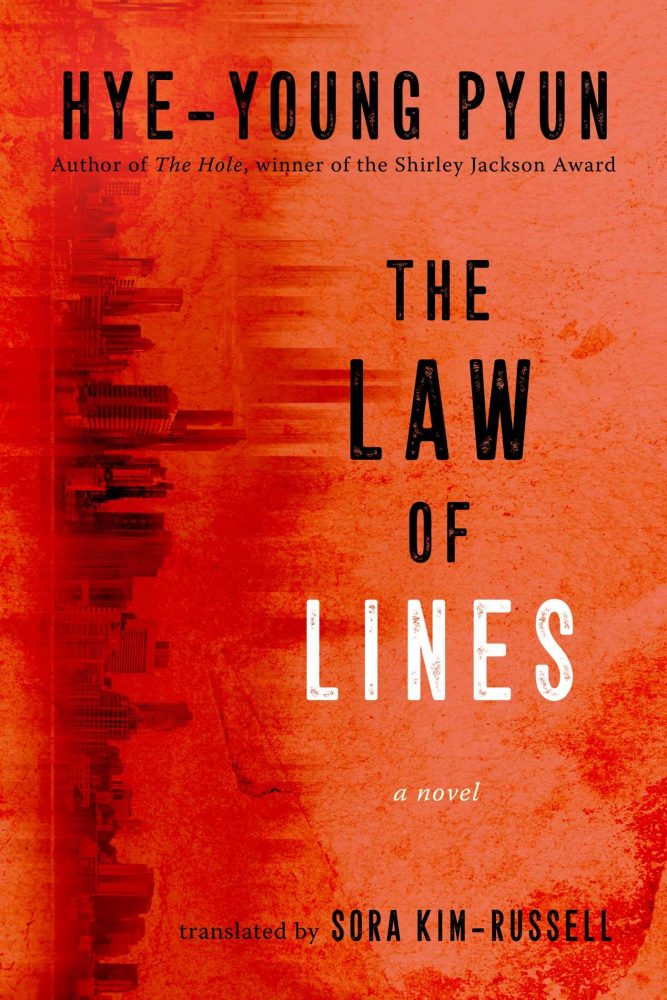Award-winning Korean author Hye-young Pyun, a writer who excels at creating and controlling her tragic heroes like a puppet master does a marionette, is my favourite Korean author in translation. Her works The Hole and City of Ash and Red are masterpieces of genre fiction which both carved out new niches within the psychological horror and kafkaesque genres respectively.
With The Law of Lines, she turns to the mystery genre and does the same again: turning the style on its head with savvy and ferocity.

The Law of Lines offers two separate narratives: one of an almost agoraphobic young woman who lives with her father, and the other an exhausted school teacher. These two narratives at first appear to be two parallel lines, drawn far apart and entirely unrelated. But, as their stories progress, these lines begin to face one another and, eventually, twist and bind together in unexpected ways.
What these two narratives share in common from the outset is a visit from Death. Se-oh, our nervous and timid young protagonist, is one day sent out on an errand and returns to find her house engulfed in flame, a fire which also kills her father.
Ki-jeong, our beleaguered high school teacher, also suffers a painful loss when a phone call explains that her sister was found drowned in the river of another town. At the beginning of the novel, we flit between these two women’s lives. We see Se-oh frightened and timid, afraid of the outside and crumbling whenever she must leave the house.
We watch Ki-jeong struggle with her almost sadistic colleagues and a student who has fallen in with a crowd of thieves but often brings her stolen gifts. These two women are fleshed out exactly enough for us to form an image of, and a bond with, them, before they are each sent out on a journey of investigation and discovery, fuelled by suspicion, paranoia, and anger.
Se-oh is told that her father started the fire in order to free himself from a mountain of debt, but paranoid Se-oh believes the fire may have been the work of a debt-collector whom she swears revenge upon and begins to stalk. Ki-jeong feels guilt at not knowing the truth behind her little sister’s possible suicide, and hopes to alleviate that guilt by tracing Ha-jeong’s life, one that the family knew so tragically little about.
From here, how these two stories begin to overlap and intertwine is a masterwork of storytelling and narrative exploration. Hye-young Pyun has so perfectly crafted this story but, more than that, she has tuned it to an intense pitch.
The two parallel tales move like the hands of a pianist: working in unison, hitting different notes, but harmonising to create a mesmerising sound. And Pyun is the piano tuner, working hard to ensure that each note hits with sharpness, intensity, and weight.
Mystery stories offer a unique experience: a rollercoaster of thrills for the reader which must be carried by a constant but shifting momentum. In true Hye-young Pyun fashion, however, The Law of Lines is more complex than that.
After all, what we have here is a pair of narratives, entirely separated from one another. Of course, it’s written on the walls from the beginning that they will not remain separate; otherwise, what would be the point?
They might as well be two novellas bound in a single book. But it’s not the fact that they begin to overlap that impresses, nor even how they overlap, but rather the themes and questions which explode out of this narrative collision.
Born from the overlap of these two stories are angry and aggressive political themes of misogyny and control, the vulnerability of young people (especially women), the corrupting power of money, the success to be found through intimidation and force.
It’s a book about power and the myriad ways that it corrupts both those who hold it and those who are threatened by it. The Law of Lines explores power dynamics in a very literal and on-the-nose way, as well as in the more subtle and silent moments.
Hye-young Pyun is a revolutionary within the realm of dark genre writing. The Hole took the trend of claustrophobic psychological horror and drew it out to its logical extreme, trapping its protagonist not in a house or a spaceship but in his own body, helpless and alone with a villain who only reveals her true terror when he is unable to escape or even move.
Likewise, City of Ash and Red was a bold and brave homage to Franz Kafka. Not only a kafkaesque novel but a book so assertive with its themes and ideas that it could have been written by Kafka himself. Given how Pyun is so able and willing to take an established theme or genre and do something new with it, it’s no surprise that what she does here works just as deftly.
Pyun has an approach to writing which boldly states: if there doesn’t seem to be space enough in this genre for my works, I’ll knock down the walls and make space.
Bold and brash themes and ideas do not a solid novel make, however. The Law of Lines does not make a success of itself on concept alone. It’s the characters and stories that carry and nurture these concepts of power, paranoia, and fear which make it work so flawlessly.
Both Se-ho and Ki-jeong are such fully dimensionalised women, with clear motivations and personalities. But they are also not on equal footing. Ki-jeong is written as such that she requires little backstory. Se-oh, on the other hand, is a blank slate and a mysterious protagonist.
The unravelling of her story is also the unravelling of Ki-jeong’s personal mystery, and it is what truly binds these women together. The fact that they are both protagonists, and yet begin in very different places, adds a delightful and satisfying level of dynamism to their narrative threads.
Conclusion
Hye-young Pyun has managed to conquer and almost redefine the psychological horror and kafkaesque genres. Now she has spun an entirely new kind of web within the mystery genre, knotting into that web themes of corruption, power, abuse, and fear.
The Law of Lines is an ambitious novel which proves that no idea or style can ever be finished or exhausted; there is always room for more, provided you’re smart enough.
And Hye-young Pyun is certainly smart enough. She knows her genres, her stories, and her characters. She knows how to manipulate them with a fearsome and commanding voice, and The Law of Lines is proof of this. Another masterpiece by one of Korea’s best pioneering writers.



